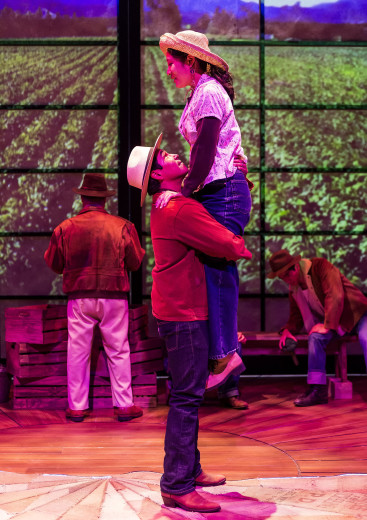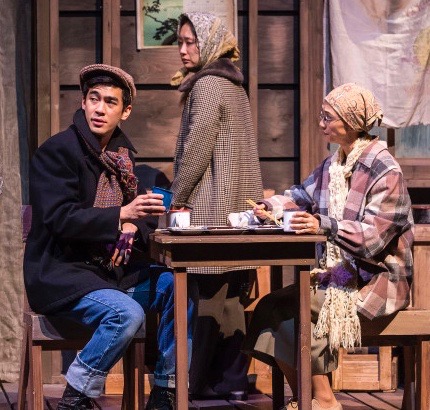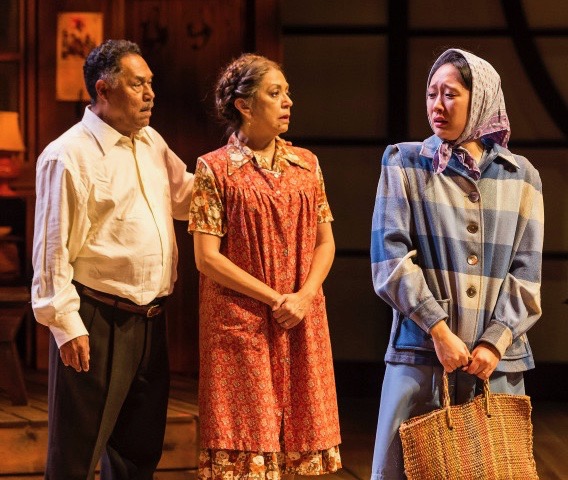There is so much to love, admire and respect about Luis Valdez, the man who brought an upstart Chicano theatre into the world in the 1960s with his El Teatro Campesino (The Peasant Theatre), starting with his actos, those short and defiant pieces first performed in the green fields of central California, then on city streets and, still later, on legitimate stages where they were finally recognized as the roughhewn but striking acts of defiance that they were.
Landing at the right time as offshoots of the larger Cesar Chavez protest movement that included the grape strike of the 60s and 70s, those actos made Chicanos visible, forcing us to take a closer look at what was going on in America’s roiling backyard.
The new awareness culminated in 1978 when the late Artistic Director Gordon Davidson invited Valdez to stage his Zoot Suit at The Center Theatre Group’s Mark Taper Forum. In this full-length play, based on the 1942 Sleepy Lagoon murder of an L.A. man and the racially motivated Zoot Suit Riots that followed, Latino gang members were tried, convicted, and eventually released for inadequate evidence. More than ready for this by 1978, Latino audiences showed up in droves at the Mark Taper. For Valdez, it was the validation of a long and triumphant journey.
It was challenged the following year, however, when Zoot Suit went to Broadway — which hadn’t a clue and judged it by customary standards, rather than the emerging ones of protest and rebellion. A revitalized Zoot Suit, mounted at The Taper in 2017, a year short of its 40thanniversary, showed a few signs of age, brought on by changing theatrical styles and a changing political climate.
With the premiere last week of Valley of the Heart, Valdez’s most recent play that just opened at The Mark Taper Forum, there is evidence that those cracks have deepened. The very title has a sentimental ring that announces a mellower mood. And yet its focus is on a story that very much wants to be told with something more than a forgiving tone. It’s about the fallout from the country’s misguided internment of American citizens of Japanese descent during World War II on two families of different heritage linked by life and marriage.

Valdez, who has directed the piece with his son, Kinan Valdez, has chosen to tell it by evoking a serene Old California viewed through the lens of a romantically old-fashioned postcard.
The two families involved are the Yamaguchis and the Montaños. The Yamaguchis are small ranchers, comfortable, kind, dedicated to hard work and patriotism. The Montaños are the sharecroppers on the ranch, also dedicated to family, hard work and patriotism, as well as to the Yamaguchis, who have been welcoming and generous. They all get along living in neighboring houses on the ranch, one a bit more affluent than the other, though not by much. It’s close to a perfect life in a perfect world.
But this is 1941. When the government fatefully decides it’s time to intern Japanese Americans, the Yamaguchis do not hesitate to turn over management of the ranch to the trusted Montaños during their forced exile, before setting off for internment camps that will radicalize their lives in ways they cannot begin to imagine. Daughter Thelma Yamaguchi (Melanie Arii Mah) is in love with Benjamin (Lakin Valdez), a Montaño son. So first there is a wedding, following an expendable scene in which a callous Japanese suitor for Thelma’s hand is supplanted by her true love, Benjamin Montaño, to everyone’s approval.
Of course, the newlyweds are separated when Thelma is eventually relocated with her family to Wyoming’s Heart Mountain Relocation Camp. A baby is born in that camp and Daddy Benjamin visits now and then, bringing bounty from the ranch which is thriving under the Montaños. The forcible split is hard on everyone. There are a few ramifications and a few instances of resistance and expressed unhappiness with this unwelcome situation. A couple of other Montaño offspring enlist to fight the so-called good war, as does a Yamaguchi son, arousing all the mixed emotions that such decisions provoke, to say nothing of some of their more tragic consequences.

That’s as much of the plot as is a good idea to reveal, and while the events are entirely believable, the placid optimistic manner in which they are presented, discussed and accepted, plus the general benevolence that reigns between the families, even when they disagree, result in an oddly tame and inorganic version of this ugly piece of history.
Considering that we’re living in a time when anti-immigrant rancor is making headlines and its uglier manifestations are brutishly dividing us, you’d think that a play about an earlier example of profoundly wrongheaded American policy would be a perfect foil for Valdez. The enormity of the damage done cries out for a robust response.

Yet the absence of almost any animus, and this soft vision of the terrible injustice done to Japanese Americans seen through such forgiving glasses, is somewhat confounding. It is a tale told in an accommodating, traditional format that feels almost quaint. Where’s the pushback? The passion? The indignation?
Anger, indignation and repudiation are there in name only. The underlying energy that should fuel them is not. One can argue that it’s a choice and that Valdez has every right to make it. He does, but it carries dramatic penalties — for the play and for the actors who cannot rise above the material. There is a tendency towards the stereotypical, in the characters and even in the dialogue, that creates a bit of a Barbie-and-Ken world. The conflicts lack conviction, while all the good behavior flattens dramatic tension.
The physical environment is another matter. Valdez makes very effective use of kurogos, the traditional recessive figures, clad entirely in black from head to toe used in Kabuki Theatre to invisibly move people and things. David Murakami’s idyllic projections of a Santa Clara Valley in full bloom, and John Iacovelli’s gorgeous sliding Shoji screens, reflect the melding of the differing ancestries.
The sound track completes the blending of the two cultures — including the melancholy strains of a solitary flute and percussive sounds that are integral to Kabuki. Daniel Valdez was the music consultant and Philip G. Allen did the sound design. PJ and Roy Hirabayashi are credited with original compositions and arrangements, while Noé Yaocoatl Montoya furnished additional arrangements.
To be clear, the intentions that went into this production are unquestionably honorable, but the results, which remain uneven, cannot help but prompt thoughts of what might have been.
Top image: The company and setting of Valley of the Heart at The Mark Taper Forum.
Photos by Craig Schwartz.
WHAT: Valley of the Heart
WHERE: Center Theatre Group’s Mark Taper Forum, 135 N. Grand Ave., Los Angeles, CA 90012.
WHEN: Tuesdays-Fridays, 8pm; Saturdays, 2:30 & 8pm; Sundays, 1 & 6:30pm. Ends Dec. 9. Exceptions: No performances Nov. 13, 14 & 22 (Thanksgiving). Added show: Nov 19, 8pm.
HOW: Tickets $30-$99 (subject to change) available at 213.628.2772 or online at CenterTheatreGroup.orgor in person at the Center Theatre Group Box Office (Ahmanson Theatre at The Music Center). Groups: (213) 972-7231. Deaf community: Info & charge, CenterTheatreGroup.org/ACCESS.
